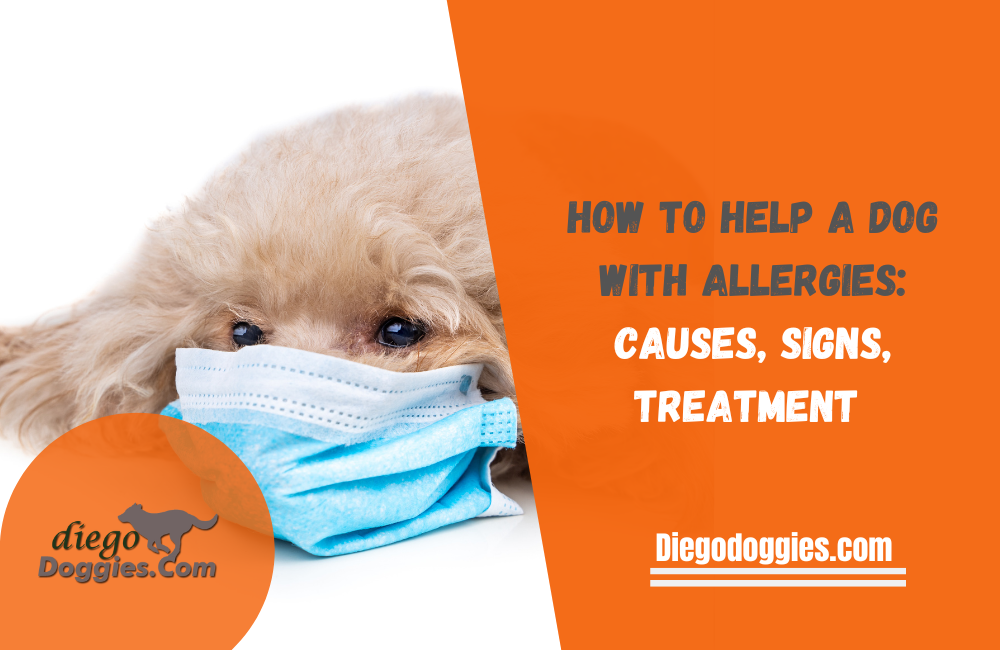Dogs can suffer from allergies just like humans do. In fact, many of the same things that cause human allergies can also cause allergic reactions in dogs. If you think your dog might be suffering from allergies, it is important to get them checked out by a veterinarian as soon as possible.
In this blog post, we will discuss the causes of allergies in dogs, the signs that you should look for, and how to treat them.
The Causes of Allergies in Dogs
Allergies in dogs are common, but there are many things that can cause them. Some of the most common allergens include pollen and dust from flowers or weeds; mold on buildings (especially if it has been recently renovated); animal hair such as dander which is found all over pets including cats & horses- not just Dogs!
Sometimes an ingredient used for food packaging like soybeans will trigger allergies too – so make sure you read labels carefully before giving your pup any treats made with those ingredients. In addition, sometimes environmental factors play can cause allergic reactions.
The Common Causes of Dog Allergies That Veterinarians Find
Allergies are a common issue for both people and pets. In fact, according to the American Kennel Club, around 10 per cent of dogs suffer from allergies. While there are many potential causes of these allergies, there are a few that veterinarians find to be particularly common.
One of the most common allergens for dogs is flea saliva. Even a single bite from a flea can cause an allergic reaction in some dogs. As a result, it is important to keep your dog on a regular flea prevention schedule.
Other common allergens include pollen, dust mites, and mold. If your dog is showing signs of allergies, such as excessive scratching or sneezing, it is important to bring them to the vet for an evaluation. With proper treatment, most dogs can live happy, healthy lives despite their allergies.
The Signs of Allergies in Dogs
The dog’s skin may be showing signs of an allergic reaction. This includes excessive scratching or licking, and bald spots on the body that are red and/or inflamed with plenty of sneezing involved in addition to watery eyes for those who have allergies just like humans do!
If you notice any of these symptoms, then it would not hurt at all to take your pup in to see their vet so they can get checked out ASAP – do not let this go untreated because there could potentially be serious consequences if left unchecked such as hair loss from areas where friction has occurred when rubbing against furniture and similar fittings.
How to Check Your Dog’s Skin For Signs of Allergies
Checking a dog’s skin for allergies is one way to help determine if they are experiencing an allergic reaction. Allergies can cause several skin problems in dogs, including excessive scratching or licking, bald spots, hot spots, and red or inflamed skin. If you notice any of these symptoms, it is important to take your dog to the vet for an evaluation.
Checking the dog’s skin can be done at home by taking a close look at their coat and skin. Checking for bald spots, hot spots, or red or inflamed skin are all signs that your dog may be experiencing an allergic reaction and should be seen by a vet as soon as possible.
Treatment of Allergies in Dogs
The best way to treat allergies in dogs is to avoid the things that are causing the allergies. If you are not sure what is causing your dog’s allergies, your vet may recommend allergy testing. Once the cause of the allergies is determined, you can collaborate with your vet to create a treatment plan that may include avoidance, medication, or immunotherapy.
There are several options for treating allergies in dogs. These include antihistamines, corticosteroids, immunotherapy, and hypoallergenic shampoos. Your veterinarian will collaborate with you to determine the best course of treatment for your dog based on the severity of their allergies and the underlying cause.
The Need For An Early Visit to The Vet For Help
If you think your dog might be suffering from allergies, it is important to get them checked out by a veterinarian as soon as possible. Allergies can be uncomfortable for dogs and can lead to other health problems if they are not treated properly. A vet will be able to determine if your dog has allergies and help you create a treatment plan. They will also tell you if you have a hypoallergenic dog.
What to do if You Cannot Get to a Veterinarian For a Regular Appointment
If you think your dog might be allergic to something, the first thing you should do is check their skin. If their skin is red, itchy, or inflamed, they may have allergies. There are a few things you can do at home to help your dog with allergies.
You can try giving them baths more often, using a humidifier, or avoiding the things that trigger their allergies.
If your dog’s allergies are severe, you may need to seek emergency medical care. If you cannot get to a vet, there are a few things you can do at home to help your dog with allergies. You can try giving them baths more often, using a humidifier, or avoiding the things that trigger their allergies.
However, if your dog’s allergies are severe, you may need to seek emergency medical care. Checking your dog’s skin for allergies and knowing how to treat them can help you keep your dog healthy and happy.
Home Remedies for Dog Allergies
In Conclusion
Allergies in dogs are caused by many of the same things that cause allergies in humans. If you think your dog might be suffering from allergies, it is important to get them checked out by a veterinarian as soon as possible. The above paragraphs highlight several signs that may indicate your dog is suffering from allergies.
Related Content
- Alga Norte Dog Park with Training Obstacles & Nice Off-Leash Areas
- Coronado Dog Beach near San Diego Offers Great Point Loma Views
- Del Mar Dog Beach with Spectacular Cliff Views
- Dusty Rhodes Dog Park in San Diego near Ocean Beach
- Fiesta Island Dog Beach Off-Leash Dog Park at Mission Bay
- Grape Street Dog Park in Balboa Park Brings Nature to the City
- Morley Field Off-Leash Dog Park in Balboa Park – Amazing Canyon Views
- Nate’s Point Off-Leash Dog Park at Balboa Park
- Ocean Beach Off-Leash Dog Beach in San Diego, CA
- Rancho Bernardo Off-Leash Dog Park in San Diego, CA
- Dog Grooming – Tips And Tools
- How To Clean A Dog’s Clothes, Sweaters, Bedding & Collars
- 10 Best Park Accessories for Dog Owners
- Is Your Dog Barking Excessively And Annoying Your Neighbours?
- Dog Grooming Take- Diego Doggies
- Restrain a Dog for Grooming: The Safe and Easy Way
- Start a Dog Grooming Business
- Adopt a Dog in San Diego: Everything You Need to Know
- Dog Training Cost? A Comprehensive Guide
- Right Dog Raincoat: The Ultimate Guide
- San Diego Dog Park Safety Tips, Training, and Dog Accessories
- What You Should Do To Become a Responsible Dog Owner
- 7 Benefits of Dog Grooming and Exercising in San Diego


2 thoughts on “How to Help a Dog with Allergies: Causes, Signs, Treatment”